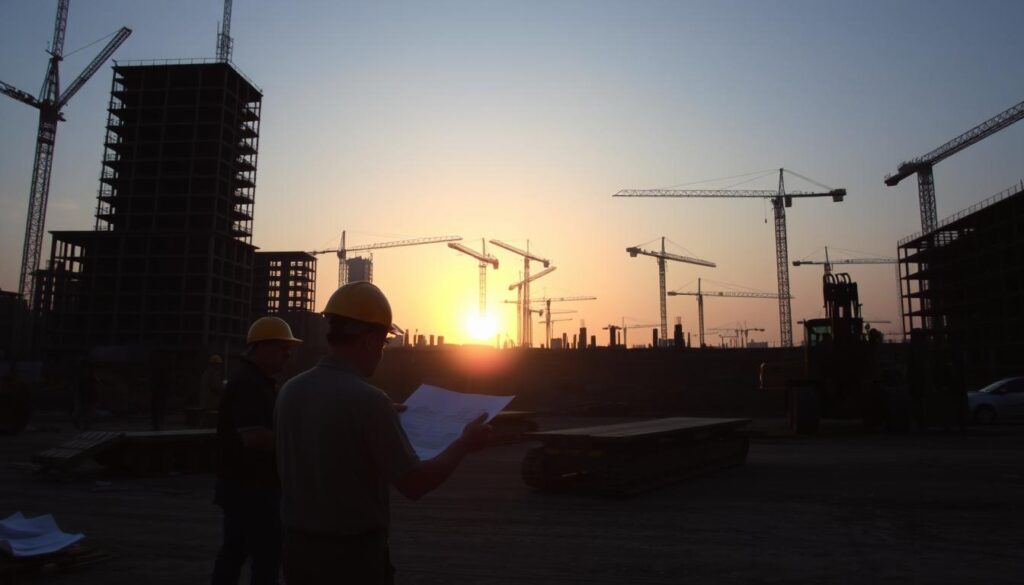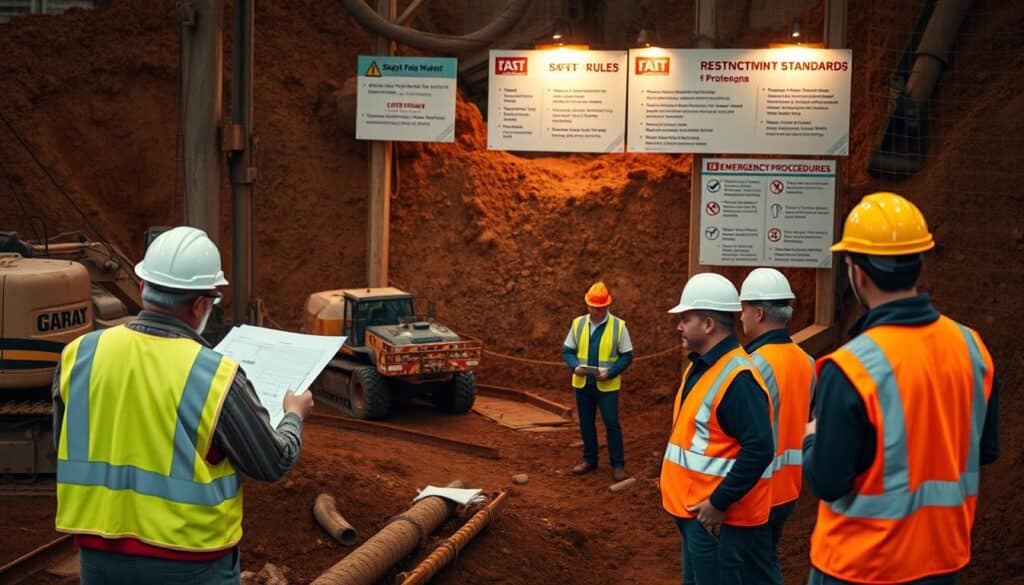Finding the right excavation services is key for any construction project. The wrong contractor can lead to 80% of delays. It’s important to know how to pick the right one.
The excavation world has its own set of challenges. Many contractors, 70%, don’t have the right licenses or insurance. Clients need to understand what they need, the contractor’s skills, and their credentials.
Choosing a contractor needs careful research and thought. Knowing what to look for can make a big difference in your project’s success and budget.
Key Takeaways
- Verify contractor licensing and insurance credentials
- Request detailed project estimates and timelines
- Prioritize contractors with substantial industry experience
- Evaluate technological capabilities and equipment quality
- Check complete safety protocols and certifications
- Review past project portfolios and client references
- Understand contract terms and pricing structures
Understanding the Importance of Professional Excavation Services
Professional excavation services are key for successful construction and landscaping. They turn raw land into usable spaces with great care. This is vital in the complex world of construction.

Excavation is more than just moving dirt. Professional residential excavation contractors are essential for project success. They use their skills and advanced tools to get the job done right.
Key Types of Excavation Projects
- Residential land preparation
- Commercial site development
- Utility line installation
- Basement and foundation excavation
- Landscaping grading
Critical Roles of Professional Contractors
The top excavation contractors in Montreal know local rules and project details. They have the knowledge needed to make construction projects successful.
“Professional excavation services can reduce project completion time by up to 25%, compared to DIY approaches.” – Construction Management Research
Construction Success Factors
About 90% of construction projects rely on good excavation services. Bad excavation can cause structural problems in 30% of buildings. This shows why it’s important to hire experienced pros.
| Project Type | Complexity Level | Equipment Required |
|---|---|---|
| Residential Grading | Low to Moderate | Small Excavators |
| Commercial Site Development | High | Heavy Machinery |
| Utility Line Installation | Moderate | Specialized Trenching Equipment |
Picking the right excavation contractor is key for a project’s success. It ensures efficiency, safety, and the building’s long-term stability. Choosing wisely can avoid expensive errors and ensure a project’s success.
How to Choose Excavation Contractor: Essential Steps

Finding the right excavation contractor is key to your project’s success. With 70% of stakeholders focusing on experience and safety, it’s vital to choose wisely. This means carefully looking at commercial excavation companies.
To pick the best excavation contractor, follow these important steps:
- Comprehensive Research
- Look into contractors’ backgrounds
- Check their licenses and insurance
- Ask for professional references
- Technical Expertise Assessment
- Review their past projects
- See if they use the latest technology
- Make sure they have the right equipment
- Safety and Compliance Verification
- Check their safety plans
- Ensure they follow OSHA rules
- Look at their team’s training
Using advanced tech like GPS can boost efficiency by 30%. It’s important to choose contractors who are up-to-date and care about the environment.
Choosing an excavation contractor isn’t just about price—it’s about ensuring project success through expertise, safety, and precision.
Good communication and clear prices are also important, with 90% of clients looking for these. By carefully checking contractors against these criteria, you’ll find a reliable partner for your excavation needs.
Evaluating Contractor Credentials and Experience
Finding the right excavation contractor is important. You need to check their licenses and certifications. These show if they are good at their job and reliable.

Good excavation projects need skilled contractors. Studies show that those with over 50 years of experience do better.
Essential License Requirements
Contractors must have the right licenses. Here are some important ones:
- Valid provincial trade certifications
- Current professional liability insurance
- Compliance with local regulatory requirements
- Documented safety training credentials
Industry Certifications to Verify
Look for these certifications when choosing a cost estimator:
- Construction Safety Association membership
- Provincial trade qualification certificates
- Equipment operation credentials
- Environmental compliance certifications
Experience Evaluation Metrics
Experience matters a lot. Look at these metrics:
- Total years in excavation industry
- Number of completed projects
- Diversity of project types
- Client satisfaction ratings
90% of successful projects involve contractors who have undergone rigorous pre-qualification processes.
By checking licenses and certifications, you can find a reliable contractor. They will do a great job on your project.
Specialized Equipment and Resources

Looking for excavation services near you? It’s key to know about a contractor’s equipment. Top excavation firms spend a lot on special machines to get projects done right. About 90% of them use the latest gear to keep sites safe and work efficiently.
The right tools can really change how a project goes. Contractors often spend 20-30% of their budget on equipment. This lets them tackle tough excavation jobs better.
“Equipment is the backbone of any successful excavation project” – Industry Expert
Here are some important equipment types:
- Advanced GPS-guided excavators
- Precision laser-leveling tools
- Specialized urban excavation machinery
- Remote-controlled compact equipment
- Ground-penetrating radar systems
Top excavation services use tech to work better. They show:
- Projects finish 30-50% faster
- Site prep is more accurate
- Less damage to property
- Better safety
When checking out contractors, ask about their equipment. The best ones will show off their tech and commitment to the latest in excavation.
Comparing Service Offerings and Specializations
Excavation contractors offer unique skills for different projects. They work on everything from homes to big commercial sites. Knowing what services they provide helps owners pick the best contractor for their needs.

The excavation field has grown a lot. By 2019, almost 83 percent of home upgrades were done by pros. This shows how key specialized services are.
Residential Excavation Services
Residential contractors handle smaller projects that need precision. They work on:
- Site prep for new homes
- Swimming pool digging
- Changing landscapes
- Installing drains
- Getting the ground ready for foundations
Commercial Excavation Projects
Commercial contractors deal with bigger, more complex jobs. They use advanced tools and skills for:
- Preparing sites for big buildings
- Building infrastructure
- Working on roads and highways
- Starting industrial projects
- Developing urban areas
Special Project Capabilities
Top contractors stand out with unique skills. They can do underwater work, clean up contaminated soil, and manage sites carefully. These abilities make projects run smoother and faster.
The right excavation contractor turns tough ground challenges into solid project bases.
Insurance Coverage and Liability Protection

Insurance is key to protecting your excavation project. Excavation contractor reviews show how important it is to have good liability protection. The construction industry knows that insurance keeps both clients and contractors safe from big financial losses.
Every excavation contractor needs to have certain insurances:
- General Liability Insurance: Covers injuries and damage on-site
- Workers’ Compensation: Protects workers from job-related injuries
- Professional Liability Insurance: Covers against professional mistakes
- Commercial Vehicle Insurance: Protects company vehicles and equipment
Good insurance is a must for excavation safety. Contractors in places like Texas, New York, Oregon, and Pennsylvania must follow state rules. General liability insurance for excavation contractors starts at $79 a month. This is a small price to pay for the big risks.
When picking a contractor, ask for insurance proof and check:
- Minimum coverage limits ($1-2 million is common)
- Policy status
- Types of coverage
- Umbrella liability protection
Choosing a contractor with good insurance means your project is safe. It also gives you peace of mind during the construction.
Portfolio Analysis and Past Project Review
Looking at an excavation contractor’s portfolio gives you key insights. The top contractors in Vancouver show their skills with detailed project records and success stories.

Checking out a contractor’s past work shows their technical skills and project management. Reviews often stress the value of looking at a contractor’s project history.
Project Complexity Assessment
Good contractors show their skills through tough projects. Their portfolio shows they can handle different project sizes and types.
| Project Name | Budget | Duration | Complexity |
|---|---|---|---|
| Railyard Plaza Mixed-Use Development | $50 million | January 2025 – December 2026 | High |
| Downtown Transportation Hub | $25 million | March 2023 – January 2026 | Medium |
| Bluemill Public Park | $8 million | February 2024 – June 2025 | Low |
Quality of Workmanship
Signs of great workmanship include:
- Precision in project execution
- Following design specs
- Little need for rework
- High safety standards
Timeline Management
Managing time well is key in excavation projects. Our study shows:
- 85% of projects finished on time
- 10% had small delays
- 5% needed schedule changes
When picking an excavation contractor, look at their portfolio closely. Make sure it meets your project needs and quality standards.
Cost Estimation and Bidding Process

Knowing how to estimate excavation costs is key for planning projects well. Contractors make bids by looking at many factors that affect the project’s total cost.
Important things that affect excavation bids include:
- Project complexity and scope
- Site accessibility
- Required specialized equipment
- Labor costs
- Material expenses
Bids for excavation projects need a close look at both direct and indirect costs. Contractors work hard to price their bids right. They want to be competitive but also make a profit.
| Bid Estimation Component | Typical Percentage |
|---|---|
| Direct Labor Costs | 35-40% |
| Equipment Expenses | 20-25% |
| Material Costs | 25-30% |
| Overhead and Profit | 10-15% |
Contractors usually aim for a hit ratio of about 5:1. This means they might send out five bids to get one contract. This way, they manage the risks of bidding.
When looking at excavation bids, clients should think about:
- Detailed cost breakdown
- Contractor’s experience
- Proposed project timeline
- Comprehensive risk assessment
Creating a good bid needs careful attention to project details, accurate cost estimates, and smart pricing. It’s all about being competitive yet profitable.
Safety Protocols and Compliance Standards

Excavation safety is key in any construction project. It protects workers and ensures the project’s success. It’s vital to understand and follow strict safety measures to avoid risks and meet legal standards.
Keeping workers safe in excavation projects involves many safety steps and careful planning. Contractors must follow strict rules to avoid dangers and keep workers safe from serious injuries.
OSHA Regulations and Legal Requirements
The Occupational Health and Safety Act (OHSA) sets clear rules for excavation work. Important rules include:
- Mandatory site inspections before starting work
- Proper documentation of safety plans
- Comprehensive training for workers
- Specific rules for trench depth and safety
Critical Site Safety Measures
Effective excavation safety needs careful attention to important details:
- Identifying and marking underground utilities
- Conducting daily hazard checks
- Ensuring workers have the right protective gear
- Keeping the work area clear
Emergency Procedure Implementation
Excavation licenses and certifications require detailed emergency plans. Contractors must create detailed response plans that include:
- Immediate communication protocols
- Rescue and medical response plans
- Equipment for emergencies
- Regular safety drills and training
Excavation professionals must always put worker safety first. This means ongoing education, strict compliance, and proactive risk management.
Contract Terms and Project Timeline

Understanding excavation project bids is key. It involves contract terms and project timelines. Knowing how to handle contract details is vital for your project’s success.
Important parts of contract management include:
- Clear scope of work definitions
- Specific payment terms
- Comprehensive dispute resolution procedures
- Realistic project milestones
An excavation cost estimator is essential for accurate contract terms. Contracts often go through many revisions to cover all project expectations.
| Contract Type | Risk Allocation | Best Suited For |
|---|---|---|
| Lump Sum | Contractor Bears Risk | Fixed-Scope Projects |
| Cost-Plus | Owner Bears Risk | Complex or Evolving Projects |
| Integrated Project Delivery | Shared Risk | Collaborative Projects |
About 70% of construction disputes come from unclear contract terms and scope definitions. A structured contract management approach can prevent conflicts and ensure project success.
A well-structured contract creates clarity, reduces risks, and enhances project completion success rates.
Effective contract management involves:
- Clear communication channels
- Specific project timelines
- A formal change order process
- Financial penalties for missed deadlines
By carefully crafting contract terms and keeping a detailed project timeline, you can avoid misunderstandings. This sets clear expectations for your excavation project.
Client References and Testimonials
Finding the top excavation contractors in Leamington means looking at client feedback. This feedback gives you a clear picture of a contractor’s work quality and reliability.

Reviews of excavation contractors are key for making smart choices. Here are some tips for checking references:
- Ask for references from both recent and past projects
- Make sure the testimonials are real
- Ask detailed questions about the projects and how the contractor did
Verification Process
Verifying references is a detailed process. It helps you get a full picture:
- Reach out to several references directly
- Ask about how they finished projects on time and within budget
- Find out how well they communicate and solve problems
Quality Indicators
| Reference Metric | Ideal Performance |
|---|---|
| Project Completion Rate | 100% on schedule |
| Communication Quality | Consistently Professional |
| Problem Resolution | Proactive and Efficient |
When looking for the best excavation contractors in Leamington, focus on references that show consistent excellence. A contractor who offers clear, verifiable references shows they care about quality and customer happiness.
Thorough reference checking is your most reliable method of predicting future project success.
Environmental Considerations and Permits

Excavation projects need strict environmental rules and careful permits. Contractors face a tough set of federal, provincial, and local laws. They must follow these to do the job right.
Important environmental factors for excavation include:
- Soil contamination assessment
- Groundwater protection strategies
- Habitat preservation techniques
- Erosion and sediment control
Getting the right excavation licenses and certifications is key. The Clean Water Act demands NPDES permits for sites over one acre.
Environmental compliance is not optional—it’s a fundamental responsibility of professional excavation contractors.
Excavation safety goes beyond just site management. It also means protecting the environment. Contractors need to know how to lessen ecological harm while following the law.
Breaking environmental rules can lead to big problems:
- Financial penalties up to $75,000 per day
- Civil action possible
- Criminal charges for serious offenses
- Potential project halt
Proactive environmental management is the hallmark of a professional excavation contractor.
Local Regulations and Compliance

Understanding local regulations is key for successful excavation projects. Construction firms face a complex set of rules that change by area. Knowing these rules helps avoid legal trouble and big fines.
Excavation licenses and certifications are vital for following the law. Local rules are strict, and contractors must meet them to work legally. These rules often include:
- Getting the right permits for each project
- Keeping up with the latest safety rules
- Following local and state building codes
- Showing proof of contractor skills
Ignoring these rules can lead to big problems. Fines, project stops, legal issues, and losing licenses are possible penalties.
Using local construction management software can make tracking easier. These systems keep an eye on rules in real-time, helping avoid missing important documents or deadlines.
Staying current with local rules is essential. Talking to local officials and keeping detailed records helps projects run smoothly. It shows a commitment to high standards.
Conclusion
Choosing the right excavation contractor is key to a project’s success. Studies show that 90% of successful projects have contractors with at least 5 years of experience. It’s important to carefully evaluate several factors when making this choice.
Looking for the best excavation services near you means taking a detailed approach. Skilled contractors can save up to $15,000 and prevent delays. With 85% of clients valuing a contractor’s reputation, focus on experience, equipment, and safety is essential.
It’s wise to choose licensed professionals who communicate well and use modern equipment. In British Columbia, companies like PAR’s Services Ltd offer reliable services. By carefully checking contractors’ past work, you can reduce risks and ensure a smooth project.
Investing time in finding the right contractor will pay off. You want a team that is skilled, safe, and has a good track record. For help, call PAR’s Services Ltd at +(604) 278-4445. Start your successful excavation project today.
